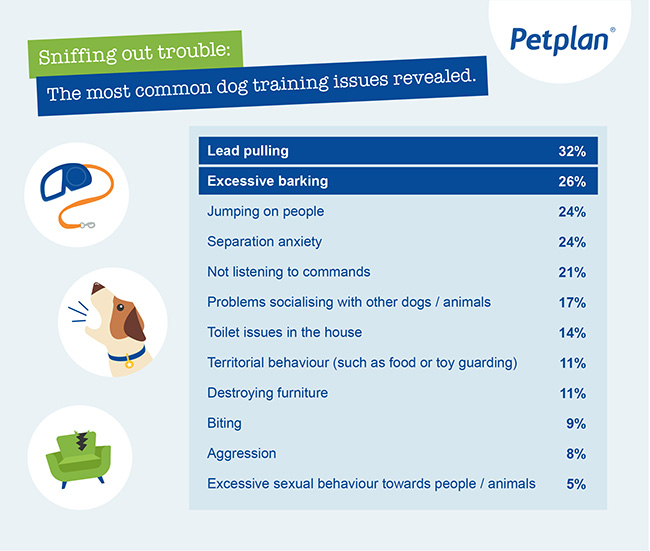However well trained your dog is, the ageing process can make all those good behaviours they learned feel like a distant memory. So can you train an older dog and get them back into better habits?
Old Dog, New Tricks
The expression “you can’t teach an old dog new tricks” dates back to 16th century Tudor England. But is it really true, or just a slogan with more bark than bite?
We polled more than 1,000 dog owners across the UK to explore their biggest doggy dilemmas when it comes to behaviour and training older dogs. We discovered:
- 73% believe you can teach an old dog new tricks, with Liverpool residents the most likely (81%) to agree that “older dogs can be trained”.
- Edinburgh is the city where people are most confident (94%) about training their adult dog
- Just 13% of Generation X (45-54-year-olds) said they’re ‘very confident’ about dog training. Meanwhile, 28% of Gen Z said they “don’t know how to train my dog” – just 8% of over-55s answered the same.
- Lead pulling was the biggest behavioural challenge among dog owners – 32% of responses – while reward-based training (such as treats) was the most frequently used training technique (57%) to overcome challenges.
- The capital of clicker training was Greater London – 24% of Londoners said they use this method.
Are we ‘dog’ confident?
Whether it’s the rise of home working or the ‘race for space’, the lifestyle changes of recent times have seen an increase in dog ownership. On the face of it – the more dogs the better! But as Britain fast becomes an Isle of Dogs, it’s vital that we make sure our training techniques are up to scratch – even for older dogs.
According to the PDSA Animal Wellbeing (PAW) report 2023, 60% of veterinary professionals saw an increase in dog behavioural issues between 2021 and 2023. So when it comes to dog training, are we confident we’re not barking up the wrong tree?
- Overall, a net 83% of people told us they’re ‘confident’ about their dog training abilities. Breaking it down, 23% were ‘very confident’ and 60% were ‘somewhat confident’.
- More than a quarter (26%) of males were ‘very confident’ with their dog training compared to 20% of females.
- Just 13% of Generation X (45-54-year-olds) said they’re ‘very confident’ about dog training, versus 28% of younger millennials (25-34-year-olds) – the age group with the greatest confidence.
So when it comes to dog training, do we know what we’re doing?

Behavioural barriers
So while most of us are ‘dog confident’, what’s holding some of us back?
Over time, dog owners are faced with various behavioural challenges. For example, older dogs often get more vocal in their later years.
But we wanted to know what behavioural difficulties are getting owners hot under the collar.
What are the main behavioural challenges you face with training your dog?

Of course, some pooches behave perfectly. Regionally, the East Midlands was the part of the country where people were most likely (33%) to say they don’t experience any challenges with dog training.
And perhaps experience counts. Baby boomers (aged 55+) were the most likely – 29% – to say they don’t have difficulties with dog training, compared to just 2% of Gen Z (16-24).
But why do some of us train in vain? We asked dog owners to describe some of the barriers they experience when training their adult dog.
- “Insufficient time” was the top answer (27%) followed by “not training my dog consistently” (25%) and “it’s too expensive” (23%).
- Males were more likely than females – 33% versus 20% – to cite time as the biggest barrier. Meanwhile, a quarter of females (25%) said the cost of training is the biggest challenge, compared to 21% of males.
- Strikingly, 28% of Gen Z told us they simply “don’t know how to train my dog” – way above the 8% of over-55s who said the same.
Whether it’s a lack of time, money or knowledge, it’s perhaps no surprise that the PDSA Animal Wellbeing (PAW) report 2023 found that just 8% of dog owners used a trainer or behaviourist in the 12 months before the report.
Every dog has his day
While training our beloved dogs can sometimes be no walkies in the park, there are lots of methods you can use to motivate your dog. We asked our survey respondents what worked best for them.
If you experienced challenges with dog training, what methods do you use today?
Reward-based training (such as treats) |
57% |
Classical conditioning (such as gradually introducing your dog to new stimuli) |
28% |
Clicker training |
16% |
No training methods |
5% |
Other |
1% |
Digging into the data, our survey found that females were more likely than males to use reward-based training – 62% versus 53%.
Additionally, the capital of clicker training was Greater London, where 24% said they use this method.
You can teach an old dog new tricks
There are many reasons why people are cautious about dog training – from time and money to a lack of knowledge. But our survey suggests that people do believe that training is worth it in the end.
- 73% agreed with the statement that “older dogs can be trained”, rising to 79% among 16-24-year-olds.
- Liverpool was the city where people were most likely to agree (81%) that you can teach an old dog new tricks.
- Across the regions, Wales was the most likely part of the UK to agree that “dogs are intelligent animals and are quick to learn new tricks” (40%).
Finally, we asked the public what additional support they’d like to receive for help in training their dog. Among those who said they lacked confidence when it comes to dog training, 47% said they would like to get help from a dog trainer, while 33% would want help from a dog behaviourist. Additionally, 31% are keen to access ‘easy to understand resources’.
Just because you’re not a qualified dog trainer or behaviourist, that doesn’t mean you don’t have the solution in the palm of your paw. Petplan has an array of tips from Nick Jones, Dog Behaviourist and Dog Expert Witness here.
We all want our beloved pet dogs to thrive. And one thing’s for sure – the majority of Brits believe it’s never too late to train our canine companions.
The findings from Petplan’s survey confirm what many of us already know: training a dog, regardless of age, is not only possible but can be highly beneficial.
As our furry friends grow older and our own lifestyles change, it’s crucial to adapt our training methods to ensure our pets remain happy and well-behaved. From addressing common challenges like lead pulling to utilising positive reinforcement techniques, effective training can significantly enhance the bond between owners and their dogs, which helps lead to content owners and happy dogs. Too much change, too quickly, can be stressful for older dogs, so using age-appropriate training techniques is essential.
Petplan is dedicated to supporting dog owners with practical advice and resources to help them navigate these challenges successfully.
If you're a Petplan customer, you have 24/7 access to Pet Expert Chat, our free video vet service where you can get expert advice on behaviour, as well as nutrition and health advice. Simply login to your My Petplan account to get started.
